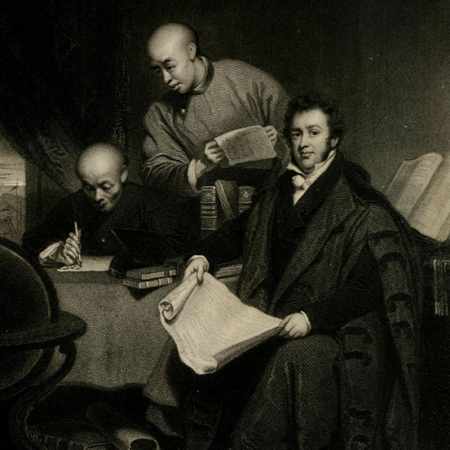Here is the latest inspirational and informative article on influential Scots in Church History and Missions by Paul James-Griffiths of Christian Heritage Edinburgh.
Paul writes, “This week we have moved from India to China in our series of missionaries from Scotland. Today’s article is about Robert Morrison, the Anglo-Scot who first translated the whole Bible into Chinese and produced the first Chinese dictionary. Although he only left behind a small group of converts in China, the Bible he translated had a huge impact over many years.”

Robert Morrison (1782-1834), engraved by Jenkins from a painting by George Chinnery (1774–1852),
Public domain, via Wikimedia Commons.
Robert Morrison (1782-1834) was born near Morpeth in Northumberland. His father was Scottish and his mother English, but they were both committed to the Church of Scotland and so Robert had a Presbyterian upbringing. When he was born in 1782, the church in Britain and America had undergone a significant revival, resulting in mission societies sprouting up everywhere. As trade links developed between Britain and the world, opportunities opened up for mission work abroad.
After his mother’s death in 1804 he applied to London Missionary Society (LMS), having previously been ordained as a Congregationalist minister. He longed “that God would station him in that part of the missionary field where the difficulties were greatest, and, to all human appearances, the most insurmountable”, for in this way, he believed, the greater glory would go to God.
After being accepted by LMS, Morrison trained under Dr David Bogue at the Gosport Academy. Bogue, a Presbyterian Scotsman from Berwickshire, had studied theology at the University of Edinburgh, but ended up being a Congregational minister in England. It was known by scholars that a partially translated New Testament in Chinese existed, which had been made by Jesuits, and Bogue in particular was keen to see that the whole Bible was translated and distributed to the millions in China. It was at his insistence that Morrison was chosen for this difficult task.
Whilst in London, Morrison studied medicine at St Bartholomew’s Hospital and astronomy at the Greenwich Observatory, as well as Chinese with an immigrant from Canton City. In this way he became equipped with the language well before arriving in China. After preaching in London, Glasgow and Edinburgh, and being ordained in a Scottish church in London, he set sail for China in 1807, eventually arriving in Macau. He knew it would not be easy, for he faced three obstacles: firstly, it was forbidden for any Chinese person to teach their language to a Westerner on pain of death; secondly, he was not allowed in China for any other purpose than trade; and thirdly, the Roman Catholic priests there would oppose any Protestants. He had to live a secretive existence in hiding, whilst he employed an overpriced local to teach him, and was robbed on several occasions by people he had come to trust. His isolation in one room was often unbearable, but he persevered and began to master both the Mandarin and Cantonese languages.
In 1809 he was married to Mary Morton in Macau, and on the same day received an appointment to work as a translator with the East India Company, so in this way he no longer had to work in secret because he was part of the British trade in China. Although the British company only thought about making money through his skill, he rejoiced that he could now develop openly into a fully native speaker. He pressed on, producing a Chinese dictionary, with fellow Scottish missionary, William Milne, which would be vital for British-American relations with China, and translated the Acts of the Apostles and Gospel of Luke. But when the local Roman Catholic bishop had copies of the latter work burnt, it gave a strange message to the Chinese that ‘Christians’ were in a sort of civil war. Furthermore, he was threatened with the death penalty by local authorities for introducing Christian literature in Chinese.
Despite all of these setbacks he continued until by 1824 he had translated the entire Bible into Chinese. At about this time even more dangerous clouds were appearing on the horizon, when there would be a struggle between the tyranny of the Chinese magistrates on the one hand, and the obstinate and unrighteous pressure of the British government to force the opium trade on the Chinese on the other. Such heavy-handedness by the British would lead to the infamous Opium Wars and the hatred of Westerners as ‘white devils’ would grow.
Morrison realised that it was unsafe to set up a printing press in China, so he looked for another more stable option. In 1818, he and Milne were granted the right to establish a school for Chinese and Malay children in Malacca, on the Malaysian peninsula, which also became the base for their printing press. In naming it the Anglo-Chinese College they hoped that it would be a bridge between Chinese and Malaysian people, and the West. With British protection, this mission base became an effective disseminator of Chinese Christian literature all over the world.
When Morrison died in 1834, he left only a tiny church of ten converted Chinese who met in hiding, but there were many other secret believers who had obtained his Chinese Bibles, despite the lockdown on their illegal distribution. After the secret baptism of Cai Gao, the first known Protestant convert in China, Morrison wrote: “May he be the first-fruits of a great harvest, one of millions who shall come and be saved.” Morrison’s work was indeed foundational for the future of the Chinese church, now numbering in the tens of millions, far beyond anything he had dreamed.
“Go therefore and make disciples of all the nations” (Matthew 28:19, NKJV).
